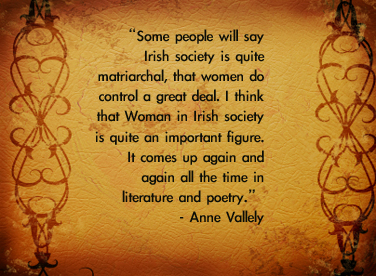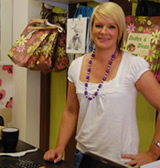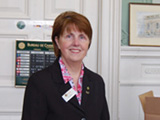Women of strength
Mna power in Ireland
A heavily pregnant woman stands before a king, pleading for mercy. The king, angered by her husband’s boasting, has ordered her to race his prized horses. No one speaks on her behalf, and the race is run. As she victoriously crosses the finish line, she gives birth to twins, a boy and a girl. The boy, she says, will be their strength, but the girl will bring them five days of weakness – that of a woman in labor – whenever they are about to go into battle. This was the curse of Macha.
Irish legends are known for their longevity, and thousands of years later the legend of Macha has not died out, especially in Armagh, County Armagh, Northern Ireland. Armagh even comes from the Irish Ard Mhacha, meaning "Hill of Macha." Women here might not possess power like Macha's, but they can hold their own.
This wasn't always the case, however, as Ireland went through the same period of patriarchal domination that most of the world experienced. In We Are But Women, a book about females in Irish history, Rogery Sawyer writes, "...despite the intervention of periods in which women have fulfilled apparently passive roles, fundamentally Ireland is not a man’s world. "

Ask many of the local women, and they will all tell you the same thing: Women are moving up in the world, and the next generation is going to keep the progress going: "Younger people want more, and they're more able to progress, " asserts Jacqui Hornsey, a shop worker at The Drop Inn Thrift Shop on Upper English Street. "They're not afraid. My children know exactly what [they] want to do." That's different from when she was growing up, she admits: "It was harder for me to say, "Okay, I want that job, I'm going to head for that job."
A few doors down at Dudes and Diva's Kids Wear, Leona McClelland, another shop worker, has a much more succinct view of the future: "We're much better, obviously, " she laugh. "Women can multitask as men can't. We're not scared of work."
Before Macha comes the figure of Aine, meaning mother. "You've got Aine who was way before the Celtic Era," states local resident Anne Vallely. "That would be where the whole idea of [the Woman] would start, really, in Ireland with Aine, the original mother. Going back to the Macha figure, that really predates the whole Christian period which then went into a more patriarchal sort of arrangement."
Local historian and librarian at the Irish Studies Library, Mary McVeigh disagrees with the "over-romanticized" view of women in history. She claims there’s no correlation between the revival of Irish society and the rise of females to power. "Women were excluded," she complains, but "I think [they] have probably been more influenced by outside events like the woman's suffrage movement, which would have come from England."
It was through philanthropic work and religious orders that women improved both the community and their stations, McVeigh claims. "There were quite a number of women involved in the suffrage movement," she states. "There were women involved in religious orders to bring education and hospitals and welfare. There were women working to change laws for the betterment of women. I am not one that believes in individual strong women. I am more concerned with movements rather than individuals."
Vallely had a different take on what caused those of her gender to come into power again: "We have people like Lady Gregory, who would have been a great friend of William Butler Yeats, the poet. She would have been responsible for what’s known as the Irish literary revival at the end of the 19th Century, where Irish consciousness was raised, and I supposed the main poet to do that was Yeats. But that interestingly led to, in a roundabout sort of way, the "1916 Rising," which was Ireland's attempt to break free of British rule. That whole revival gave the political movement a spur."
Women continue to spur change and progress on the island and in Armagh. In the past decade the city has seen its first female Lord Mayor, Pat O'Rowe, and a female reverend at the Church of Ireland, Rev. Grace Clunie.




